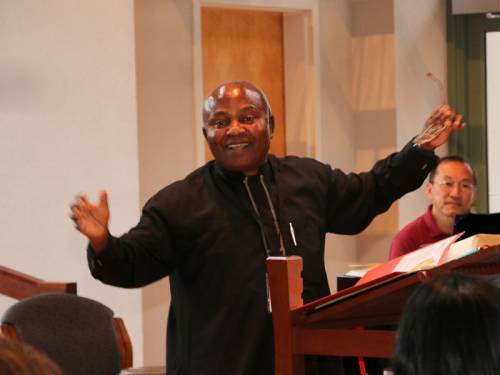Presbyterian Center worshipers try singing in unfamiliar languages and in those closest to their heart
by Mike Ferguson | Presbyterian News Service

The Rev. Princeton Abaraoha, field staff for African Intercultural Ministries, calls the community to worship Wednesday in the Presbyterian Center Chapel. (Photo by Tammy Warren)
LOUISVILLE — To celebrate Intercultural Church Day, worshipers at the Presbyterian Center in Louisville Wednesday were invited to sing verses of well-known hymns — “How Great Thou Art” and “Blessed Assurance, Jesus is Mine!” among them — in English, Korean and Spanish, as well as in the “language closest to your heart.”
Then they heard a pair of brief reflections on what the intercultural church looks like.

The Rev. Shanea Leonard, Associate for Gender & Racial Justice, told worshipers “there’s something about coming together around a meal.” (Photo by Tammy Warren)
The Rev. Shanea Leonard, Associate for Gender & Racial Justice with Racial Equity & Women’s Intercultural Ministries, told worshipers she believes cooking “is my spiritual gift. There’s something about coming together around a meal. Isn’t that what fellowship is like?”
At such gatherings, “all our cultures come together and co-exist. You can bring all of you and I can bring all of me. Curried chicken and matzo ball soup show up. We don’t have to leave who we are at the door,” she said. “You are celebrated at the table for just being who you are.”
Members of the early church described in Acts 2 had all things in common. Those commonly-held items included the joy, hope and love they shared each time believers came together, Leonard said. “That’s what it means to truly be the body of Christ,” she said.

Blake Collins, Associate for Young Adult Volunteer Recruitment and Relationships, offered a reflection based on time he spent in Peru following that country’s internal conflict. (Photo by Tammy Warren)
Blake Collins, Associate for Young Adult Volunteer Recruitment and Relationships in World Mission, spoke about the time he spent in Peru following years of internal conflict in the South American country. When people there continued to ask him for opinions on events he hadn’t witnessed, it dawned on him that’s what white privilege is all about.
“Sharing this experience is uncomfortable,” he said. “But that discomfort is a holy discomfort, a good place to be.”
In Matthew 15, which recounts Jesus being challenged by the Syrophoenician woman, “he hears a challenging word and responds with grace,” Collins said, celebrating her faith and standing with her. While the common encouragement is “Don’t just stand there — do something,” people involved in intercultural work know the ministry of presence — “Don’t just do something — stand there,” is every bit as important, he said.
Racial Equity & Women’s Intercultural Ministries highlighted some action steps congregations and mid councils can use to become intercultural, or more intercultural. Among them:
- Take the 21-Day Racial Justice Challenge, which invites Presbyterians to do something every day to raise awareness about the perniciousness of racism and to encourage action in response to that awareness. Learn more here by selecting Focus #2, “Dismantling structural racism.”
- Encourage your mid council or congregation to hold cultural humility and antiracism training.
- Urge candidates for ministry to engage in internship and/or field education experiences in intercultural settings.
- Encourage all PC(USA) members — especially those in predominantly white groups — to work to end racism by focusing on these eight steps: Recognition, Repentance, Resistance, Resilience, Reparations, Reconciliation, Recovery and Resonance.
Intercultural churches have these qualities:
- They respect and embrace different cultures, holding each as equally valuable.
- They treasure the different cultural contexts that God gives to different individuals and communities.
- They offer a positive vision of the whole community, together in its difference.
- They encourage a healthy critique of each other’s points of view. They also value the give and take of respectful relationships and take steps to become a multilingual community.
![]() You may freely reuse and distribute this article in its entirety for non-commercial purposes in any medium. Please include author attribution, photography credits, and a link to the original article. This work is licensed under a Creative Commons Attribution-NonCommercial-NoDeratives 4.0 International License.
You may freely reuse and distribute this article in its entirety for non-commercial purposes in any medium. Please include author attribution, photography credits, and a link to the original article. This work is licensed under a Creative Commons Attribution-NonCommercial-NoDeratives 4.0 International License.
Categories: Advocacy & Social Justice, Matthew 25, Racial Justice
Tags: Blake Collins, intercultural church, matthew 25, racial equity and women's intercultural ministries, rev. princeton abaraoha, rev. shanea d. leonard
Ministries: Racial Equity & Women’s Intercultural Ministries, Matthew 25 in the PC(USA): Join the Movement